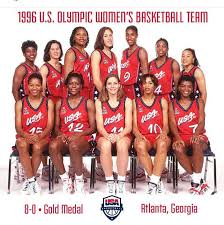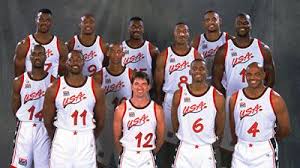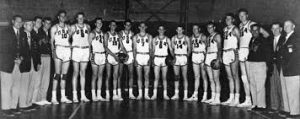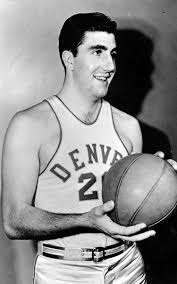The NBA Finals date back to 1947 (when they were known as the Basketball Association of America Finals) and the very 1st NCAA tourney was held in 1939. Olympic basketball competition is even older: it debuted as a demonstration event in 1904 and the men’s version became a medal sport in 1936, with the women finally getting their chance to go for the gold in 1976. The United States has dominated Olympic basketball competition from the start: the men have won 15 gold medals in the 18 tournaments they have participated in during the past 84 years, while the women have won 8 gold medals in the 10 tournaments in which they have competed during the past 44 years. Those of you who were looking forward to the 2020 Olympics opening ceremonies in Tokyo on July 24, 2020 will have to wait an extra 364 days, as the coronavirus caused a postponement until July 23, 2021. Due to the absence of college basketball since mid-March, HoopsHD’s Jon Teitel decided to fill the void by trying to interview as many prior Olympic players/coaches as possible so that you have something to read this summer while not watching the Summer Games. We continue our coverage by chatting with Ruthie Bolton about winning a pair of gold medals. Today marks the 24th anniversary of Ruthie having 15 PTS/5 STL in a 111-87 win over Brazil to clinch her 1st gold medal.
You had 19 siblings, 1 of whom was your older sister Mae: how close were you 2, and what was it like to be teammates with her at Auburn? We are pretty close and it was a beautiful thing to play together in college. She was always bossing me around but in a good way because she felt the need to take care of me. Our relationship grew from there and she has always been overprotective of me: she was even my agent at 1 time and still helps me out with some management things.
Take me through the 1988 Final 4:
In the semifinal you had a Final 4-record 10 STL in a win over Long Beach State: what is the secret to playing great defense? I think the girl who I stole the ball from the most (Penny Taylor) still has never forgiven me! I did not have the prettiest game back then but I loved proving myself so I wanted my team to know that they could depend on me. I got better down the stretch and was known for my aggressiveness on the national team. I still tell people that if you can lock down someone on defense then your coach will notice it.
In the title game you scored 16 PTS in the 1st half of a 2-PT loss to Louisiana Tech: how tough was it to go against fellow future Hall of Famer Teresa Weatherspoon in the 2nd half (as you went scoreless)? When I think about that it just reminds me that Teresa was such a tough player and a great defender as well. I did not have a scorer’s mentality so if I was not open then I did not force the issue. I think they were not expecting me to score so much in the 1st half and they just made some adjustments at halftime. Even though we did not win we still made history: I respect her highly and if anyone ended up beating me then I am glad it was her.
Take me through the 1989 Final 4:
In the semifinal your team set a Final 4 record by only committing 6 turnovers in a 5-PT win over Louisiana Tech: was your team out for revenge against the defending champs, and how sweet was it to beat them? We were big on defense, which helped us win 119 games during my 4 years. I was clueless but just played with a lot of heart. I tried to create my identity and prove myself to my coach: I was a late-bloomer who just needed time to develop my game. I often think about how my resilience helped me succeed: I am probably in the 1% of players who took a Greyhound bus to show up to college and prove themselves! My dad taught me that having a tough mindset and being confident were very important. ESPN did a documentary on my life story: I was not an All-American but got better every year and never took “no” for an answer. That is also a major theme of my book called “The Ride of a Lifetime” (www.amazon.com/Ride-Lifetime-Ruthie-Bolton/dp/0977728005).
In the title game you lost to Tennessee: what was it like to face a conference rival with a national title on the line, and how did you prepare to face a team coached by Pat Summitt? Tennessee was just amazing: they were our Achilles heel and always gave us the biggest challenge. It was so sad to see a coach who had such a huge impact on her sport pass away before her time a few years ago. They came out of a timeout and the game turned completely around: her players were motivated and just flipped the switch. I remember Coach Summitt talking to us during the Olympics: she fired us up so much that we were ready to play!
After graduation you spent about a decade as a 1st Lieutenant in the Army Reserves: what impact did your service have on you either on or off the court? Teamwork is what I learned the most about: even when you are part of a team you still have individual responsibilities. It was a springboard for my professional career and helped me build my mental toughness. We would get out on the obstacle course and by the end of the day I had done something that I did not think I could have done. I encourage kids to join the military if they need time to grow and learn about themselves.
At the 1996 Olympics in Atlanta you led team USA with 23 STL in 8 games to win the gold medal (then won another gold medal 4 years later in Sydney): where do you think that 1996 team that went 60-0 ranks among the greatest in the history of the sport? We really made history that year after making a ton of sacrifices. I am still living it and those memories remain a huge part of my life. We spent a lot of time away from our families and had some intense training, but it made it so worth it because we were so determined to see the process come alive. The only thing we cared about was winning a gold: there was no Plan B and anything else would have been a failure. I appreciate that our entire coaching staff and our teammates were committed to a common goal: there was beauty in our struggle. When we stepped onto the court against the Brazilians Coach Tara VanDerveer told me that I had to play the best defense of my life, and I told her that I would. I was in the zone and there was no stopping me. Coach did a great job of preparing us: we were ready to show the world what we could do.
You played 8 years in the WNBA for Sacramento and were a 2-time All-Star: when you were growing up did you think that there would ever be a women’s pro league in the US, and how excited were you when you learned that it was actually going to happen? I had a lot of options and was prepared to go overseas. When I 1st heard about it I was so excited to play in my home country so it was a dream come true. I never thought that it would happen when I was growing up: I cannot believe that it has been around for 20+ years. I think that our Olympic success was a big factor in the league being founded and I feel like we were the pioneers. My kids are so proud of my success, which makes me so happy, but I want them to create their own identity and do great things themselves. I had to work hard for what I got and I want them to understand that.
After a career-threatening injury in 1998 your knee was repaired by former Olympic speed-skater/orthopedic surgeon Eric Heiden: is he a better athlete or doctor?! He was not supposed to do my surgery but the other doctor was out of town at the time. After he told me that he was a 5-time Olympian I figured that he was a good choice! He said that it would be a hard injury to come back from but I was able to bounce back with my everyday determination to not let circumstances keep me from overcoming my injury. I wanted to show my critics that I could play at that level again.
You remain in the top-35 in WNBA history with 312 3PM: what is the key to making shots from behind the arc? I was a late-bloomer in terms of shooting but I think that the key is repetition. You have to challenge yourself and get into the gym and shoot. Even if I am playing in a charity game I want to compete and play hard: when I go after loose balls my opponent will not believe it. I will never let anyone outwork me: you have to be willing to pay the price.
In 2011 you were inducted into the Women’s Basketball Hall of Fame: where does that rank among the highlights of your career? I was pregnant at the time so I was not able to look like a sexy basketball player but it was still great to be there. I never thought that I would become a Hall of Famer but it reminded me how far I had come after not being recruited. I thanked my high school coach for challenging me to dig deeper: if it was easy then perhaps I would not have worked as hard. They only give you 5 minutes to discuss the past 25 years of your life, which is not easy, but it was beautiful.
You previously worked as head coach for the women’s basketball team at Vacaville Christian High School: how do you like coaching, and what do you hope to do in the future? I coached in the past but then shifted to player development. I am hoping to get a job at the next level but am still doing some speaking on women’s empowerment. Hopefully the big man upstairs has that plan for me and I love coaching.
To learn more about Ruthie’s amazing career you can purchase the SEC Storied film “Mighty Ruthie” at: www.youtube.com/watch?v=N1j4dQiLPUg












